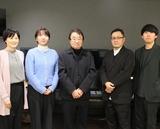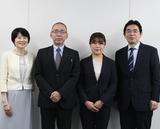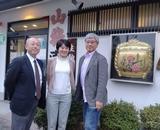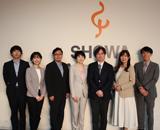September 2012
Abitus Thinks Ahead, Globalized Human Resources
The Qualities Required of Globalized Human Resources Who Take on the World
Ohsato: The demand for globalized human resources is becoming even bigger. What do you think the qualities required of globalized human resources are?
T. Miwa: Language skills are of course important, but I'm beginning to think that what's important in language is not so much the pronunciation or grammar--they don't have to be perfect so long as the other person understands what you want to say. A Japanese businessman that I met in China said something interesting to me. He said, "If you go on a business trip up north, just make an excuse and say, 'I learned my Chinese in the south,' and when you go south, tell them 'I learned my Chinese in the north'". (Laughs)

Ohsato: This is something that can also be said about me, but I think Japanese people are too much of a perfectionist. Good pronunciation and proper grammar are important, but when doing business, the most important objective is to be understood.
T. Miwa: That's right. I also think that if you want to be active on the global stage, you should be thinking of a timeline--what you should do while you're in your 20s, what you should do in your 30s, and so on. I think the thinking of acquiring language skills and specialized knowledge between your 20s and 30s is going to become even more common going forward. There are many ways to acquire qualifications and careers other than by becoming a U.S. certified public accountant. I think we're in an age when each individual can demonstrate his or her strengths in a field that he or she aspires to by accumulating global knowledge.
Ohsato: What are your thoughts on the globalization of the seasoned generation--the veterans?
T. Miwa: Once one is in his or her 40s or 50s, the ability as administrator to manage foreigners becomes a requirement. In particular, from now on, people will find more and more that they have people from other parts of Asia as his or her subordinates. This may of course be the case while in Japan, but you may also be asked to relocate to Beijing or Shanghai and find yourself working in a management position there. Each country has its own customs and way of thinking. Will the knowledge of a language be enough for a person to be able to serve well as an administrator? No, I don't think so. General management skills are what become necessary as a globalized human resource.
Ohsato: Japan needs to take leadership in Asia, don't you think?
T. Miwa: Exactly. They say that there is no vitality in Japan, but each country has its own problems. If you look at Japan overall, you will see that Japan isn't in a bad position in any way. I truly believe that there is no need to be pessimistic at all. There are many things that we should be proud of about Japan--beautiful cities; disciplined people who follow rules; clean, state-of-the-art factories; technological capabilities; and the reliability of products made in Japan. These are all a part of an admirable Japanese culture.
One of the missions of globalized human resources is to understand the good points of their home country and to communicate those points while conducting business overseas. When we think about Japanese culture, we tend to focus on the arts, such as the tea ceremony and flower arrangement. However, there are many other elements of Japanese culture in the business realm that I would like to communicate to the world. I would like to be able to tackle new things with greater confidence and with my head held high. After all, while the markets in Japan become smaller due to the declining birthrate and an aging population, the markets in the rest of Asia are becoming even larger, and we have no choice but to look outward towards such markets.
Ohsato: When we think of people in Asia who are globally active, the activities of people from areas like Singapore as well as the overseas Chinese stand out. From now on, however, I hope to see more from Japanese globalized human resources. I think that even among the Japanese, the young generation has a very global outlook. I feel a high awareness among the young generation of a need to acquire another language in addition to English.
T. Miwa: That's very good.
Ohsato: I think that in another 10 years, there will be many Japanese people who speak multiple languages and have global business skills for being active locally in other part of Asia. Change is taking place at an incredible rate, so I have to make sure that I don't get left behind. (Laughs)
T. Miwa: Yes, people want personnel that will be recognized for their talents locally in other parts of Asia, and I think there is no question that such people will increase in number.
Ohsato: Well, here's my last question. What is the strength required to compete globally? What do you think your own strengths are, Mr. Miwa; what is your analysis?
T. Miwa: I think more than anything it is that I "like" it. I think I like creating an organization that achieves global growth--that I like working with different cultures and people from many different countries. What if we were to relocate Abitus headquarters to Hong Kong? I bet it would be great fun, and I get excited just thinking about it. Looking back, when I was a university student, I spent one year as an exchange student at the University of California, Santa Barbara. Perhaps it is that I can't forget the fun I had then, the excitement I felt doing things with overseas people.
Ohsato: You really do look happy when you are overseas. I have much to learn from you regarding your passion for advancing your business to overseas markets as well as your stupendous footwork. Thank you very much for your time and for sharing your valuable thoughts with us today.

Feature Interview Index
















